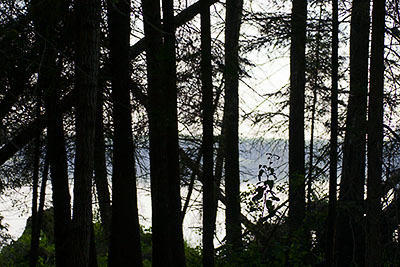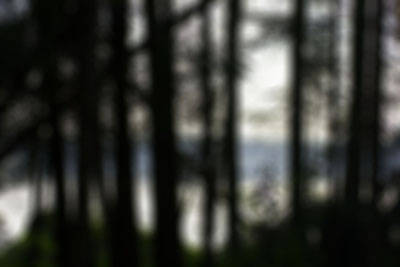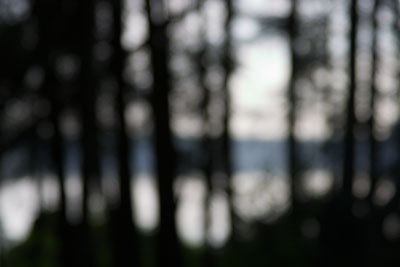This is great! Thanks for asking Ray, I think I might be able to explain a little bit about what goes into the out-of-focus images that might shed some light onto how I got to this point. First of all, I'm a photographer, not a painter- so I need to use a camera. I tried my hand at painting, but was never entirely happy with what came out (usually a not-great rendition of a good photograph!).
When I first started experimenting with defocusing the entire image, the goal for me was to abstract, or "hide" the details of what I was photographing in order to concentrate the attention onto the larger forms and patterns of the landscape. I had become frustrated with photographs that were not portraying well the impact that I felt when I reached for my camera, or that were ruined (or at least lessened) by "excessive" detail when what I was
trying to capture was the overall feel of the scene.
So I tried the out-of-focus thing, and kind of liked it. After playing with it a bit, I had a similar thought as you, why not take all the pictures
in focus, and blur them afterwards? This way I'd have both versions, more control, and I could work on it in my office where the bugs aren't nearly so bad. After all, that's how I shoot black & white these days.
So with that in mind, I went out, took some side-by-side, in- and out-of-focus shots of scenes where I would have taken just a blurry shot, and sat down with photoshop for a while. Here's one example:

1. sharply focused

2. same photo as above, blurred in photoshop

3. same scene, defocused in-camera
This scene is a good example where I felt that the details of the tree branches, and all the scraggly stuff in there, was getting in the way of what I was
actually trying to take a picture of, i.e. the shape of the trees in front of the lake, the green of the near shore, and the blue of far shore. Technically speaking as well, these small details, when so strongly backlit are often plagued by purple-fringing and chromatic abberations.
As you can see, there's a significant difference between what I could do with the blurring filters in PS versus what I could achieve with the optics of my camera lens (and yes, I did try my best in PS).
For me, what is lost in the PS version is the way that light is transformed by a camera lens. There are a couple crucial elements that I found missing in the PS version;
1. the way that the bright highlights are rendered as disks of light (known as the "circle of confusion"- see Sean's website!)
2. the way that, although there is nothing in sharp focus, depth is still communicated by differences in the degree of blurriness. The little sapling in the foreground (middle-right) is nearly completely obscured, and the trees are non-uniformly blurred (this is more apparent in a print).
To me, the the PS version looks "murky" and blurry, rather than out-of-focus. (I know this is a pretty fine distinction, and one that I have muddled almost continually)
Other examples are more extreme. I'd challenge you to take the in-focus version of the "three suns" image, and make it look like the out-of-focus version.
To me, there is something special about the way that a lens distorts different types of light, and the ultimately, how that light is recorded by my camera. There is also something essential, to me, in the point that James made; my blurry pictures are attempts, as are my non-blurry ones, to capture something that is there, that is
present in front of me, on the landscape. I am a photographer for the same reason that I am a biologist by trade: I love the forest. But the reason that I am a photographer and not a painter is that I also love the camera, and the way that a camera specifically, allows me to portray the forest.
Another reason that I prefer to use my lens to abstract these images, rather than photoshop, also ties into this last point. As has been discussed previously here, people expect a photograph to represent something "true" or "real", rather than something that was "invented" by the artist. By not giving the viewer the "excuse" to be able to think "oh, it's been photoshopped" (which is a big turn-off for many people, maybe even more than a completely out-of-focus photograph), I can force people to believe that what I've captured in my camera was
really there, and from there they can respond to it. I hope too, that this might help people to understand that
no photograph is a depiction of a scene in a completely unaltered state.
Whew, so there you go- that's why I use my camera. (I also prefer to spend my time out there looking through my viewfinder, than at home staring at my monitor- bugs or no...)
Any comments on any of this would again, (of course) be most appreciated
Jonathan